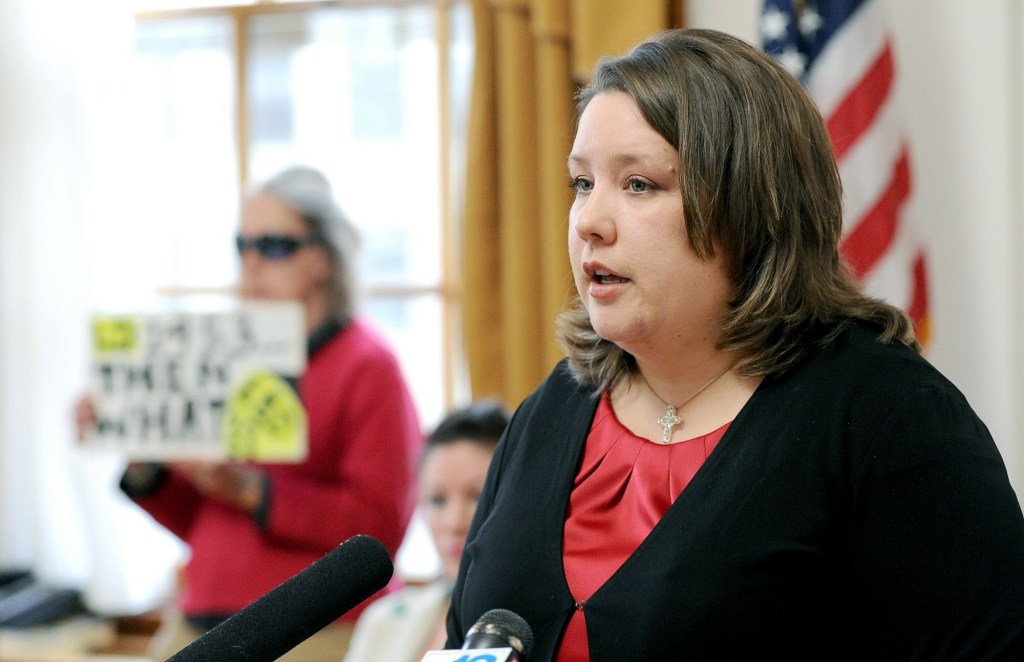Democratic Rep. Diane Russell of Portland said Wednesday she is reintroducing a bill to legalize and tax the sale of marijuana and products that contain the drug for recreational use.
Russell’s first attempt at legalization was voted down in the House, 107-39, in June. However, the measure may have gained support after voters in Washington state and Colorado last week legalized recreational use of the drug. They are the first states to do so.
The time is ripe for another try in the Maine Legislature, Russell said.
“Why can’t we be bringing this market to the white market, out of the black market, and out of the hands of the drug dealers?” Russell said.
Maine voters also gave Russell’s party majority control of the Legislature for the first time in two years, although a Democratic spokeswoman indicated the bill will not be a top priority in the upcoming session.
“Democrats are going to be focused on legislation that helps rebuild Maine’s economy and strengthens the middle class. That’s where we want to focus our energy this session,” said Jodi Quintero, communications director for the House Democratic Office.
Russell said her proposal would generate new sales tax revenue for higher education, law enforcement and other needs. She also said she believes regulating the sale of marijuana at licensed locations would make it easier for law enforcement to hold suppliers accountable and keep the drug out of the hands of children.
“The only way we can do that is to regulate it,” Russell said Wednesday in a telephone interview.
Dr. James H. Maier, a retired psychiatrist from Scarborough who has spoken out about marijuana’s health effects on teens, said he believes legalizing recreational use of the drug would make it more accessible to kids.
“Anything that makes the use of marijuana more widespread is a public health experiment in reverse,” he said.
Maine is one of a growing number of states to allow medicinal use of marijuana, although users are required to have a qualifying medical condition and a doctor’s recommendation.
The new state laws legalizing recreational use in Washington and Colorado have provided hope to advocates nationwide.
“Until today, no state in modern history has classified cannabis itself as a legal product that may be lawfully possessed and consumed by adults,” said Paul Armentano, deputy director of NORML, a national marijuana antiprohibition group, in a statement after the Nov. 6 vote.
But any use of the drug is a violation of federal law, although the U.S. Justice Department has not taken a stand against limited medical marijuana programs in Maine and some other states.
State Rep. Mark Dion, D-Portland, has been a staunch supporter of legalizing medical marijuana use but said he believes Russell’s bill to legalize the recreational use of marijuana is premature. Federal law has to change first, he said.
“I think Diane’s bill sends a clear message that individual states want a rational marijuana policy but we need to temper that enthusiasm because the federal government has not weighed in yet,” Dion said. “This issue is a classic example of a federal and state conflict that can only be resolved in Washington.”
Dion, who served as sheriff of Cumberland County for 12 years before running for the State House, predicted the bill will be voted down again by the Maine Legislature.
Robert Schwartz, executive director of the Maine Chiefs of Police Association, said he has not polled members but believes police chiefs would oppose the bill. “It will get into the hands of young people. It will be just like liquor,” he said.
If passed, Russell’s bill would legalize the sale of as much as 2 1/2 ounces of marijuana per week to people 21 or older at licensed retail locations. The law would also legalize the cultivation of the plant in private settings.
The bill calls for controls, too, she said. It would outlaw use of the substance in public and in places where cigarette smoking is also banned. Employers would have full latitude to regulate their employees’ use of the drug on the job, as well.
Tax revenue from the sale of legalized weed would help pay for higher education, agriculture, land preservation and law enforcement, Russell said.
Newly elected leaders of the 126th Legislature, Senate President Justin Alfond, D-Portland, and Speaker of the House Mark Eves, D-North Berwick, did not return calls and messages seeking comment on the proposed law. Eves voted against the bill last year during a roll-call vote in the House.
Julie Rabinowitz, a spokeswoman for Gov. Paul LePage, declined to comment on the measure.
Russell said she hopes that the shift in policies across the nation could spur lawmakers who voted against her last year to come around.
“I’ve already heard from a considerable amount of folks, from one session to the next, who say, ‘I should have voted with you, you were right,'” Russell said. “I know some folks are looking at the language to see if there are some tweaks we can make to it.”
She declined to identify lawmakers who reached out to her since Election Day, saying it was a courtesy to her colleagues to keep the thoughts of others private.
Staff Writer Matt Byrne can be contacted at 791-6303 or at:
mbyrne@mainetoday.com
Send questions/comments to the editors.



Success. Please wait for the page to reload. If the page does not reload within 5 seconds, please refresh the page.
Enter your email and password to access comments.
Hi, to comment on stories you must . This profile is in addition to your subscription and website login.
Already have a commenting profile? .
Invalid username/password.
Please check your email to confirm and complete your registration.
Only subscribers are eligible to post comments. Please subscribe or login first for digital access. Here’s why.
Use the form below to reset your password. When you've submitted your account email, we will send an email with a reset code.